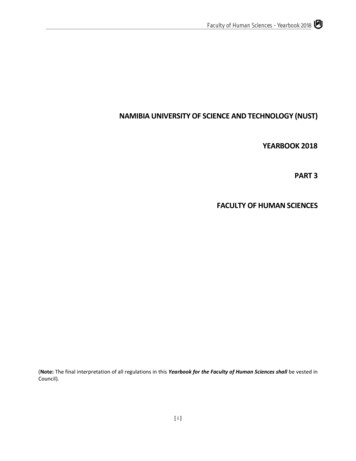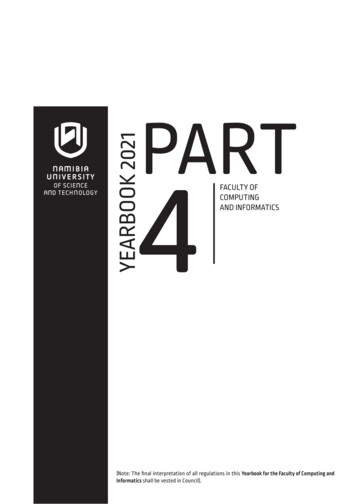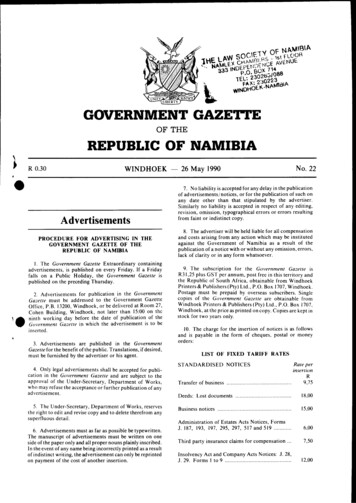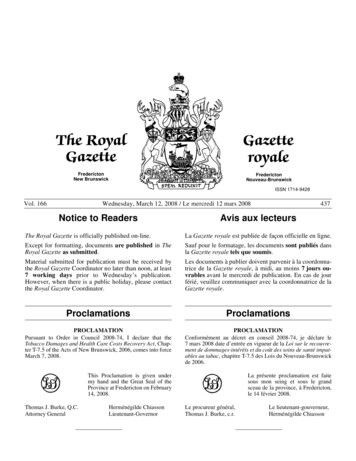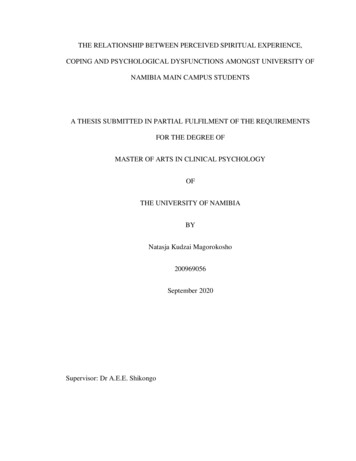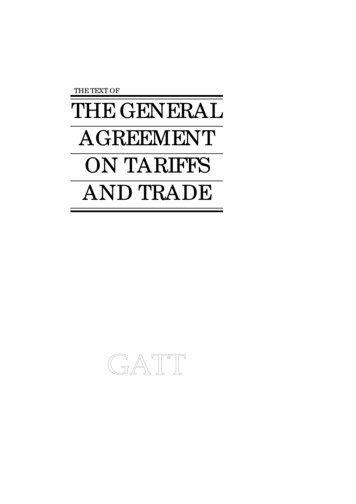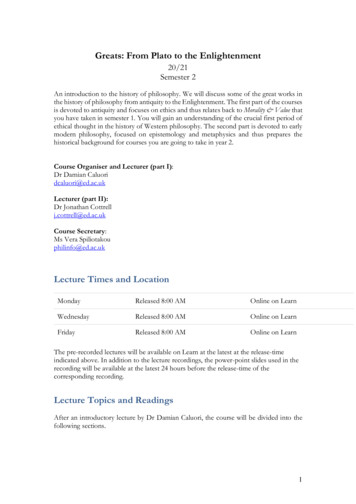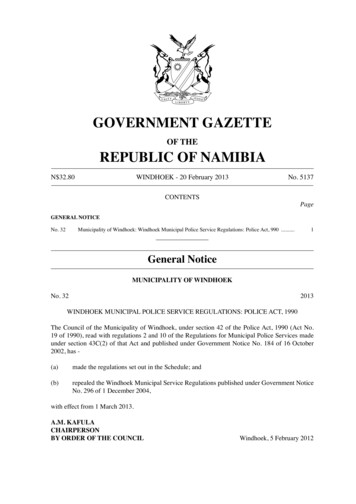
Transcription
GOVERNMENT GAZETTEOF THEREPUBLIC OF NAMIBIAN 32.80WINDHOEK - 20 February 2013No. 5137CONTENTSPageGENERAL NOTICENo. 32Municipality of Windhoek: Windhoek Municipal Police Service Regulations: Police Act, 990 .1General NoticeMUNICIPALITY OF WINDHOEKNo. 322013WINDHOEK MUNICIPAL POLICE SERVICE REGULATIONS: POLICE ACT, 1990The Council of the Municipality of Windhoek, under section 42 of the Police Act, 1990 (Act No.19 of 1990), read with regulations 2 and 10 of the Regulations for Municipal Police Services madeunder section 43C(2) of that Act and published under Government Notice No. 184 of 16 October2002, has (a)made the regulations set out in the Schedule; and(b)repealed the Windhoek Municipal Service Regulations published under Government NoticeNo. 296 of 1 December 2004,with effect from 1 March 2013.A.M. KAFULAChairpersonBY ORDER OF THE COUNCILWindhoek, 5 February 2012
2Government Gazette 20 February 2013SCHEDULEARRANGEMENT OF REGULATIONSPART lINTRODUCTORY PROVISIONS1.DefinitionsPART 2WINDHOEK CITY POLICE SERVICE2.3.4.Continuation of ServiceService Advisory BoardService Selection CommitteePART 3FIXED ESTABLISHMENT, ORGANIZATION ANDADMINISTRATION OF SERVICE5.6.7.8.9.Determination and distribution of establishmentOrganizational composition and rank structure of ServicePowers of Chief Executive OfficerAppointment of Head, Deputy Head and Senior SuperintendentIncapacity of, or misconduct by, Head, Deputy Head and Senior SuperintendentPART 4APPOINTMENT, PROMOTION AND TERMINATION OF 4.Appointment of membersProhibition of certain actionsAdvertisement of vacanciesCertificate of appointmentPromotionResignation of memberRetirementDischarge of membersDischarge on account of sentence imposedIncapacity inquiriesDisciplinary hearingsProcedures of boards of inquiryAppealsPowers of board of inquirySuspension of membersPART 5TERMS AND CONDITIONS OF SERVICE25.26.27.28.2930.31.Applicability of personnel rules and conditions of service of CouncilProbation periodWorking days and hoursOvertimeService AllowanceStandby dutyApplication for annual or special leave5137
7.48.49.50.51.52.53.54.Government Gazette 20 February 2013Annual leaveCancellation, interruption or postponement of annual leaveCompulsory annual leaveSick leaveCompassionate and official leaveBonus leaveSpecial leaveMaternity leaveExtended maternity leavePayment of leave credit at termination of contract of employmentPayment of travelling costsSubsistence and travel and special allowanceInadequate subsistence and travel allowanceReimbursement for expenses incurredSeverance payActing allowanceFringe benefitsStrikesTrade unionismNegotiation ForumPolitical activities of membersObedienceProhibition to perform private workPART 6MISCONDUCT AND GRIEVANCES55.56.57.MisconductGrievancesConduct sheetPART 7LEGAL AID: CRIMINAL AND CIVIL CASES58.59.60.Legal aid in criminal casesLegal aid in civil casesNon-application of regulations 58 and 59PART 8GENERAL PROVISIONS61.62.63.64.65.66.67.68.69.Limitation of liability and legal proceedingsEstimatesProhibition of certain dealingsMissing membersAccess to Namibian Police facilitiesReward for extra-ordinary diligence or devotionEstablishment of decorations and medals for membersCriminal statisticsSavingsAnnexure 1Ranks in ServiceAnnexure 2Uniforms in ServiceAnnexure 3Rank and Uniform Insignias of ServiceAnnexure 4Declaration of Accession to Office on Appointment and EnrolmentAnnexure 5Certificate of AppointmentAnnexure 63
4Government Gazette 20 February 2013Form 1Form 2Form 3Form 4Form 55137Misconduct Charge SheetNotice of GrievanceNotice of AppealNotice of Dissatisfaction of Outcome of GrievanceSubpoenaPART 1INTRODUCTORY PROVISIONSDefinitions1.In these regulations, unless the context otherwise indicates, a word or an expressiondefined in the Act, the Local Authorities Act, or the Regulations has the same meaning, and “Court”, in relation to labour matters, means the Labour Court referred to in section 115 of theLabour Act and the Supreme Court, and in all other matters a magistrate’s court or the High Court orthe Supreme Court;“annual leave cycle” means each period of 12 consecutive months for which a member is employedby the Council, computed from the day the member commenced his or her employment with theCouncil, but excludes any period of absence from work without pay or suspension and the anniversarydate for calculation of any leave cycle is extended with the total number of days of such absencepreceding all anniversary dates;“authorized officer” means a member who has been appointed as an authorized officer under section11 of the Road Traffic and Transport Act and registered in a category determined under regulation2 of the Road Traffic and Transport Regulations published under Government Notice No. 53 of 30March 2001;“area of jurisdiction” means the municipal area of the Municipality of Windhoek;“basic wage”, for the purpose of calculating any basic condition of employment, means that part ofremuneration in money of a member, including the cash equivalent of payment in kind, if any, paidin respect of work done during the hours ordinarily worked, but does not include (a)allowances, including travel and subsistence, housing, motor vehicle, transport, andprofessional allowances, whether or not based on the basic wage of the member;(b)a service allowance paid instead of payment for overtime worked, night time and standbyallowances,(c)additional pay for work on a Sunday or a public holiday;(d)payments in respect of pension, annuity or medical benefits or insurance;“board of inquiry” means a board of inquiry referred to in regulations 9, 19, or 22;“City Police Chief”, means the person appointed as Head;“City of Windhoek” means the Municipality of Windhoek;“Council” means the Municipal Council for the Municipality of Windhoek, and where the contextrequires, the employer;
5137Government Gazette 20 February 20135“Employees’ Compensation Act” means the Employees’ Compensation Act, 1941 (Act No. 30 of1941);“financial year” means the financial year of the Council referred to in section 82 of the LocalAuthorities Act;“gratification”, includes (a)money or any gift, loan, fee, reward, commission, valuable security or property or interest inproperty of any description, whether movable or immovable;(b)any office, dignity, employment, contract of employment or services and any agreement togive employment or render services in any capacity;(c)any payment, release, discharge or liquidation of any loan, obligation or other liability,whether in whole or in part;(d)any valuable consideration or benefit of any kind, any discount, commission, rebate, bonus,deduction or percentage;(e)any forbearance to demand any money or money’s worth or valuable thing;(f)any service or favour, including protection from any penalty or disability incurred orapprehended or from any action or proceedings of a disciplinary, civil or criminal nature,whether or not already instituted, and including the exercise or the forbearance from theexercise of any right or any official power or duty;(g)any right or privilege;(h)any aid, vote, consent or influence, or any pretended aid, vote, consent or influence;(i)any offer, undertaking or promise, whether conditional or unconditional, of any gratificationwithin the meaning of any of the preceding paragraphs;“grievance” means any feeling of dissatisfaction, injustice or unfair practice or working conditionsexperienced by a member or, in the case of a “collective grievance” a group of identified members,relevant to his or her or their job or his or her or their working environment, but excludes the executionof a lawful instruction, a charge of misconduct or a sentence imposed after a disciplinary hearing orincapacity or disciplinary inquiry;“Head” means the person appointed under regulation 5 of the Regulations as the Head of the Service,and includes an Acting Head;“Inspector-General” means the Inspector-General of the Namibian Police referred to in the Act;”Labour Act” means the Labour Act, 2007 (Act No. 11 of 2007);“Local Authorities Act” means the Local Authorities Act, 1992 (Act No. 23 of 1992);“medical practitioner” means a person who is registered as such in terms of the Medical and DentalProfessions Act, 2004 (Act No. 10 of 2004), and includes a person who is registered as a nurse ormidwife in terms of the Nursing Act, 2004 (Act No. 8 of 2004);“management committee” means the management committee of the Council as defined in section 1of the Local Authorities Act;
6Government Gazette 20 February 20135137“member”, excluding a member of the Service Advisory Committee and of a Service SelectionCommittee, means a person appointed as member of the Service, and where applicable, includes, theHead, Deputy Head and Senior Superintendent;“misconduct” means (a)the commission or omission of an act referred to in regulation 55;(b)any contravention of any other provision of these regulations, the Act or Regulations;(c)the commission of any crime or any offence;(d)the contravention of any Council Resolution or non compliance thereof;“officer” means an officer holding a rank as set out in Annexure 1;“official leave” means an official paid leave to attend a funeral of a deceased member approved underregulation 36(7);“overtime” means time worked in excess of the hours a member ordinarily works in any ordinaryworking day, but does not include any work done on (a)a Sunday; or(b)a public holiday,if it is an ordinary working day for that member;“Pension Fund” means the Retirement Fund for Local Authorities and Utility Services in Namibia orany other pension fund established under section 27(1)(c)(ii)(bb) of the Local Authorities Act, andincludes a united pension fund, to which the Council may contribute on behalf of members;“private work”, includes any enterprise or work conducted or performed by a member outside his orher normal functions as a member;“public holiday” means any public holiday referred to in, or declared under, section 1 of the PublicHolidays Act, 1991 (Act 26 of 1991);“Regulations” means the Regulations for Municipal Police Services made under section 43C(2) ofthe Act, and published under Government Notice No. l84 of 16 October 2002;“remuneration” means the total value of all payments in money and in kind made or owing to amember arising from the employment of that member, but excluding (a)any subsistence and travel allowance paid to the member for the attendance of ad hoc eventsof whatsoever nature;(b)the value of any accrued annual leave of the member;(c)service allowance; and(d)any other payment made or owing to a member that a Court found not to be included in“remuneration”;“Road Traffic and Transport Act” means the Road Traffic and Transport Act, 1999 (Act No. 22 of1999);
5137Government Gazette 20 February 20137“Service” means the Windhoek Municipal Police Service referred to in regulation 2;“service allowance” means an allowance paid under regulation 29;“staff member” means any person employed permanently or temporarily on a full-time or part-timebasis or under a contract of employment, in a post on or additional to the fixed establishment of theCouncil, and includes the Chief Executive Officer and excludes, except as otherwise provided insection 94C of the Local Authorities Act, the members of the Service and independent contractors;“supervisor” when used with regard to a member means that member’s immediate supervisorbut, for purposes of regulations 55 and 56, includes a Unit Commander, Superintendant, a SeniorSuperintendant, a Deputy Head and the Head;“the Act” means the Police Act, 1990 (Act No. 19 of 1990), as made applicable to a municipal policeservice by regulation 10 of the Regulations to the extent specified in column 1, and modified incolumn 2, of Annexure 2 to the Regulations;“unit” means the operational unit as established under subregulation 6(1) for purposes of the fixedestablishment of the Service;“unit commander” means the Senior Superintendent referred to in subregulation 6(1);“urgent work” means any emergency work which, if not attended to as soon as possible, could resultin harm to, or endanger the life, personal safety or health of any person or that of the public generallyor could result in the serious damage to or destruction of property;“week”, in relation to a member, means the period of 7 days within which the working week of themember falls; and“weekly interval” means the period between the end of one ordinary working week of a member andthe start of that member’s next working week, if any.PART 2WINDHOEK CITY POLICE SERVICEContinuation of Service2.The Municipal Police Service for the Municipality of Windhoek established by theCouncil under section 43C(1) of the Act read with regulation 2 of the Regulations and known as theWindhoek City Police Service, acronyms “WCPS” or “City Police” is continued and consists of allpersons appointed as members in terms of regulation 10 read with regulation 69.Service Advisory Committee3.(1)The Council may establish, under section 30(1)(w) of the Local AuthoritiesAct, an advisory committee to be known as the Service Advisory Committee to advise the Councilgenerally on matters affecting, or relating to, the Service.(2)The Service Advisory Committee consists of one representative of -(a)Namibian Defence Force;(b)Namibian Police Force; and
8Government Gazette 20 February 2013(c)5137Namibian Correctional Service,appointed by the Council.(3)The Service Advisory Committee may, with the prior consent of the Council, co-opta maximum of three persons and which persons have deliberative rights as members, but have noright to vote.(4)The Council may refer any matter to the Service Advisory Committee that fallswithin the terms of reference of the Committee, as determined by the Council from time to time, forinvestigation, consideration and advice.(5)The Service Advisory Committee may on its own motion investigate, consider andadvise or appoint a subcommittee consisting of elected Committee members to advise the Council orthe Chief Executive Officer on any matter falling within its responsibilities.(6)The Chief Executive Officer may assign any member or staff member to assist theService Advisory Committee in the exercise and performance of its powers and functions under thisregulation.(7)The Council may adopt rules regulating the convening and holding of meetings ofthe Service Advisory Committee, procedures to be followed at such meetings and matters incidentalthereto.(8)The Service Advisory Committee may not incur expenses without the prior consentof the Council.(9)member.The Service Advisory Committee may not issue instructions to the Head or to any(10)The Council may determine, and from time to time adjust, a sitting allowance formembers of the Service Advisory Committee who are not members of the Service or in the full-timeservice of the Council.Service Selection Committee4.(1)The management committee may appoint committee, to be called theService Selection Committee, under section 26(1) of the Local Authorities Act to advise the Headand make recommendations to the Management Committee , on the appointment of fit and properpersons as members as set out in regulation 10.(2)The Committee consists of -(a)two persons nominated by the Director-General of the Namibian Central IntelligenceService and appointed by the management committee;(b)two persons nominated by the Minister responsible for the Namibian Police andappointed by the management committee;(c)two persons nominated by the Minister responsible for the Namibian Defence Forceand appointed by the management committee; and(d)the Head, who may not be a part of the Committee whenever his or her position isbeing discussed, in which case a person nominated by the Chief Executive Officermust sit in the place of the Head.
5137Government Gazette 20 February 20139(3)The Council may, upon recommendation by the management committee, adopt aRecruitment, Selection and Employment Policy, which Policy must (a)(b)conform with (i)National Security Legislation and Standards for the recruitment andemployment of members of Police Force, inclusive of any Cabinetresolutions thereon; and(ii)the Affirmative Action (Employment) Act, 1998 (Act 29 of 1998) and theCouncil’s Affirmative Action Policy in so far as they relate to Police Force;contain at least (i)a pre-interview assessment for the purpose of short listing applicants, whichassessment must at least test (aa)arithmetic skills;(bb)problem solving skills;(cc)spatial aptitude;(dd)verbal skills(ee)written communication skills;(ff)physical skills and abilities;(gg)audio-visual skills;(hh)whether the applicant meets the requirements set out in paragraphs(c), (d) and (g) of regulation 10(3) and is not barred by the provisionsof paragraph (h) of regulation 10(3) from being employed; and(ii)the authenticity of the qualifications submitted,which tests and enquiries need not be conducted by the Committee itself;(ii)an interview assessment by the Committee to confirm and amplify at leastthe results of the pre-interview assessment; and(iii)a post interview assessment of applicants short listed after the interviewassessment, being at least (aa)a security screening by or on behalf of the members representingNational Intelligence;(bb)a criminal record screening by or on behalf of the membersrepresenting the Namibian Police; and(cc)a medical examination covering the requirements of paragraph (e)of regulation 10(3).(4)The Council may adopt rules regulating the convening and holding of meetings ofthe Committee, procedures to be followed at such meetings and matters incidental thereto.
10Government Gazette 20 February 20135137(5)The Committee may not appoint as an employer, its own employees but the ChiefExecutive Officer may designate any member or staff member to assist the Committee in the exerciseof its powers, functions and duties under this regulation.(6)The Committee may not incur expenses without having the prior consent of theCouncil thereto.(7)The recommendations of the Committee to the Management Committee must be inwriting, is confidential and may only be disclosed to persons involved in the appointments concerned.(8)A member of the Committee must disclose any interest that he or she might have inwriting and must withdraw from, and may not be present at, any discussion of such matter.(9)Any rules made under subregulation (4) may provide that a member failing todisclose his or her interest in a matter may lose his or her seat on the Committee, and the process tobe followed in that regard.(10)The Council may determine, and from time to time adjust, a sitting allowance formembers of the Committee who are not members of the Service or who are not in the full-timeservice of the Council.Officer.(11)The Head must submit the recommendations of the Committee to the Chief ExecutivePART 3FIXED ESTABLISHMENT, ORGANIZATION ANDADMINISTRATION OF SERVICEDetermination and distribution of establishment5.(1)The Council must determine the fixed establishment of the Service.(2)The Head, subject to the directives of the Chief Executive Officer, is responsiblefor making recommendations to the Council as to the numbers, grading, regarding, conversion orabolition of posts constituting part of the fixed establishment of the Service, including any reductionin or reorganization or readjustment of the Service.(3)The Chief Executive Officer, after consultation with the Head, may designate orsecond or transfer a staff member on the fixed establishment of the Council to render administrative,technical or other support services to the Service for its operational requirements and a member orstaff member so designated or seconded or transferred must render such service required under theseregulations(4)Any re-organization contemplated in subregulation (2) which involves expendituremust be approved by the Council, and may not be carried out unless prior approval for such expenditurehas been obtained.(5)Subject to section 94C of the Local Authorities Act, nothing in these regulationsprevents the Service from being part of a department referred to in section 28 of the Local AuthoritiesAct, nor does it prevent the Head of being the head of such a department.
5137Government Gazette 20 February 201311Organizational composition and rank structure of Service6.(1)Subject to regulation 5(2), the Service must be divided into such units asthe Council may from time to time determine, but every unit is under the command of a SeniorSuperintendent who may command more than one unit.(2)Subject to regulation 5, the Council may subdivide a unit into different branches orsections and assign such designation to such branches or sections and the members attached theretoas the Council thinks fit.(3)The ranks in the Service in order of precedence are set out in Annexure 1.(4)The Chief Executive Officer, if he or she thinks it expedient from time to time, maytemporarily confer a higher rank on any member, and such member holds such temporary higher rankat the pleasure of the Chief Executive Officer.(5)A member to whom a rank referred to in subregulation (4) has been conferred hasthe powers and authority applicable to such rank, but such member is not entitled to the higher scaleof basic wage or allowances applicable to such rank if the appointment is for a period of less than 30days.(6)An officer, irrespective of length of service or seniority in service or rank, is deemedto be the superior of any member over whom such officer exercises authority or to whom suchmember is reporting.(7)The Council may determine by way of directives the dress and clothing of themembers of the Service, and the control or disposal of any article or uniform or equipment by anymember.Powers and functions of Chief Executive Officer7.(1)The powers and functions of the Chief Executive Officer are as conferredand imposed by the Act, the Local Authorities Act, the Road Traffic and Transport Act, 1999 (Act No.22 of 1999), the Regulations and these regulations.(2)Subject to any limitation imposed by any of the laws referred to in subregulation (1),the Chief Executive Officer may (a)exercise or perform any or all such powers or functions personally;(b)instruct a member or a staff member to do so under his or her instruction and control;or(c)appoint a person or persons from outside the Service to advise him or her in respectof the exercise and performance of such powers and functions.Appointment of Head, Deputy Head and Senior Superintendent8.(1)The Council must appoint on its fixed establishment, in accordance withregulation 5(1) of the Regulations, a fit and proper person as City Police Chief to be the Head of theService.(2)The Council, on the recommendation of the Chief Executive Officer, may appointmore than one Deputy Head or Senior Superintendent of the Service.
12Government Gazette 20 February 20135137(3)A person appointed as Head, a Deputy Head or a Senior Superintendent must enterinto a written agreement of employment with the Council and that agreement, in addition to theRegulations and these regulations, govern the employment relationship between the Council and theHead, a Deputy Head or a Senior Superintendent.Inquiry into incapacity of, or misconduct by, Head, Deputy Head or Senior Superintendent9.(1)Regulation 19 in respect of incapacity inquiry applies to the Head, DeputyHead or Senior Superintendent, but subject to the following modifications (a)the board of inquiry referred to in subregulation (1) of that regulation is to beappointed by the Chief Executive Officer and must consist of (i)a person having knowledge and experience in labour law, as chairperson;(ii)two other suitable persons who are not in the employment of the Council,and one of whom must be a member of the Namibian Defence Force, theNamibian Police Force, the Namibian Central Intelligence or the NamibianCorrectional Service which person must hold a rank equal to, or higher than,that of the Head, Deputy Head or Senior Superintendent;(b)The word “Head” in respect of subregulations (2) and (3) of that regulation is to beconstrued as the “Chief Executive Officer”;(c)“member”, when used in relation to the person whose alleged incapacity is thesubject of the inquiry, is to be construed as the “Head”, “Deputy Head” or “SeniorSuperintendent”; and(d)“Head” in subregulations (4) and (5) of that regulation is to be construed as “Council”.(2)Regulation 20 in respect of misconduct applies to the Head, Deputy Head or SeniorSuperintendent, but subject to the following modifications (a)“member”, unless the context requires otherwise, to be construed as the Head,Deputy Head or Senior Superintendent;(b)“Head” in subregulations (1), (2), (3), and (4) of that regulation is to be construed asthe “Chief Executive Officer”;(c)paragraph (a) of subregulation (3) of that regulation is replaced with the followingparagraph:“(a)(d)a board of inquiry that consists of (i)a person having knowledge and experience in labour law, aschairperson;(ii)two other suitable persons who are not in the employment of theCouncil, and one of whom must be a member of the NamibianDefence Force, the Namibian Police Force, the Namibian CentralIntelligence or the Namibian Correctional Service which personmust hold a rank equal to, or higher than, that of the Head;”;“Head” in subregulations (7) and (8) is to be construed as “Council”.
5137Government Gazette 20 February 201313(3)Before the appointment of the board referred to in regulation 20(3), the ChiefExecutive Officer may suspend the Head, Deputy Head or Senior Superintendent from office pendingthe inquiry referred to in regulation 20, and may lift the suspension at any time.(4)The Head, Deputy Head or Senior Superintendent is not entitled to any basic wagein respect of the period of his or her suspension, except to the extent as the Council may direct.(5)During the period of his or her suspension the Head, Deputy Head or SeniorSuperintendent is deprived of the powers, duties, functions and authority vested in him or her asHead but the Head continues to be subject to the same discipline and penalties as if he or she has notbeen suspended.(6)The word “Head” in this Part, where applicable and for purposes of regulations 15to 18 includes a Deputy Head and a Senior Superintendent.(7)Regulation 22 in respect of appeals from an inquiry held under regulation 19 or 20does not apply to the Head, Deputy Head or Senior Superintendent, but is dealt with as a review oran appeal to the applicable Labour Court.PART 4APPOINTMENT, PROMOTION AND TERMINATION OF SERVICEAppointment of member10.(1)If the management committee, on the recommendation of the Head, needs tofill a post on the fixed establishment of the Service, whether by promotion or appointment or transfer,the management committee must have regard to the qualifications, relative merit, efficiency andsuitability of the person being considered for appointment or promotion.(2)A person who wishes to be appointed as a member in the Service must -(a)apply on a form determined by the Council, and confirmed under oath or by wayof solemn affirmation on that form that the information furnished by him or her isaccurate and correct;(b)allow his or her fingerprints to be taken;(c)furnish proof that he or she has not been convicted of a criminal offence contained inSchedule 1 to the Act;(d)submit himself or herself to a medical examination;(e)furnish proof of his or her age;(f)furnish proof of his or her educational qualifications; and(g)sit for an examination or undergo such educational or aptitude tests or physical,health or mental tests as the Council, after consultation with the Inspector-General,may determine.(3)Subject to this regulation, the Council’s Affirmative Action Policy and theRecruitment, Selection and Employment Policy, a person may not be appointed as a member, unless (a)the person has completed the probation period prescribed by regulation 26;
14Government Gazette 20 February 20135137(b)the Head has issued a certificate as determined by the Council confirming that theperson has successfully completed the probation period and that the person is in allrespects suitable to be appointed permanently as a member;(c)he or she is a Namibian citizen;(d)he or she is not under 18 years of age and not over 50 years of age;(e)he or she is free from any mental or physical defect, disease or infirmity which, in thereasonable opinion of the Council, will or may interfere with the proper execution ofhis or her duties or necessitates his or her retirement before reaching 60 years of age;(f)he or she has not been convicted of a criminal offence referred to in paragraph (c) ofsubregulation (2);(g)he or she has passed at least the grade 12 examination or an examination equivalentto that grade or higher or the training determined under these regulations: Providedthat the Council may for good reasons existing with regard to specific appointmentsrelax the requirement of the grade 12 examination;(h)he or she has not been dismissed from any employment as a result of misconduct ofwhich dishonesty or poor human relations are elements;(i)he or she is prepared to take the declaration of accession to office contained inAnnexure 4.(4)The Council may waive the requirement referred to in subregulation (3)(e) withrespect to any physical defect, disease or infirmity in exceptional circumstances.(5)Despite subregulation (3)(c), the Council, with the approval of the Ministerresponsible for Police, may authorize the appointment of a person with specialized experience orknowledge, who is not a Namibian citizen, in the Service in a temporary capacity for such positionsas identified and approved by the Council, but the period for which the person is appointed may notexceed three years.(6)Any person appointed as a member of the Service under th
41. Payment of leave credit at termination of contract of employment 42. Payment of travelling costs 43. Subsistence and travel and special allowance 44. Inadequate subsistence and travel allowance 45. Reimbursement for expenses incurred 46. Severance pay 47. Acting allowance 48. Fringe benefits 49. Strikes 50. Trade unionism 51. Negotiation .
